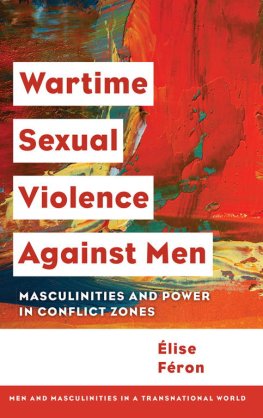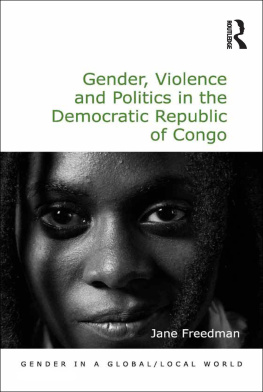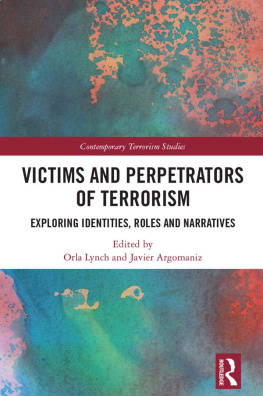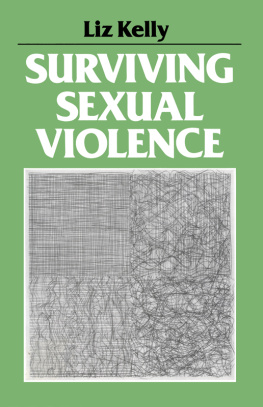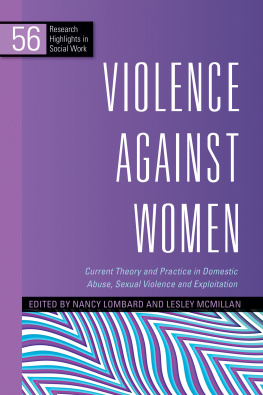Gender and Violence in Haiti
Gender and Violence in Haiti
Womens Path from Victims to Agents
Benedetta Faedi Duramy
Rutgers University Press
New Brunswick, New Jersey, and London
Library of Congress Cataloging-in-Publication Data
Faedi Duramy, Benedetta.
Gender and violence in Haiti : womens path from victims to agents / Benedetta Faedi Duramy.
pages cm
Includes bibliographical references and index.
ISBN 978081356315 2 (hardcover : alk. paper) ISBN 978 0813563145 (pbk. : alk. paper) ISBN 97808135 63169 (e-book)
1. WomenViolence againstHaiti. 2. GirlsViolence againstHaiti. 3. Sex crimesZimbabweMbare. 4. Abused womenHaiti. 5. Family violenceHaiti. 6. Female offendersHaiti. 7. WomenLegal status, laws, etc.Haiti. I. Title.
HV6250.4.W65F34 2014
362.88082'097294dc23 2013029875
A British Cataloging-in-Publication record for this book is available from the British Library.
Copyright 2014 by Benedetta Faedi Duramy
All rights reserved
No part of this book may be reproduced or utilized in any form or by any means, electronic or mechanical, or by any information storage and retrieval system, without written permission from the publisher. Please contact Rutgers University Press, 106 Somerset Street, New Brunswick, NJ 08901 . The only exception to this prohibition is fair use as defined by U.S. copyright law.
Visit our website: http://rutgerspress.rutgers.edu
Manufactured in the United States of America
For Johan, the love of my life, and our little Leonardo
Contents
This book could have not been either started or successfully completed without the support and contributions of several people to whom I am therefore profoundly grateful. My deepest gratitude goes to Deborah Rhode, whose encouragement, remarkable expertise in gender discrimination, and genuine devotion to womens rights have been an incommensurable source of inspiration and example. For support and thoughtful comments, I am also thankful to Jenny S. Martinez, Helen Stacy, Lawrence Freedman, Manuel Gomez, Deborah Hensler, Allen Weiner, Terry Karl, Amalia Kessler, Richard Roberts, George Letsas, Monica McDermott, Michelle Mckinley, Allegra McLeod, Michael Musheno, Mary Ellen OConnell, Sarah Paoletti, Nadine Puechguirbal, Natalie Man, Carol Shabrami, Sofia Candeias, Barron Bixler, Allison Carruth, Dara Kay Cohen, and Matteo Lodevole. I also thank my editor, Marlie Wassernman, at Rutgers University Press, for her precious suggestions and, more important, for believing in this book.
This study could have not been possible without the generous support of the following institutions: Golden Gate University School of Law, a group of faculty colleagues and the library staff; Stanford Law School, the Freeman Spogli Institute for International Studies at Stanford University, the Michelle Clayman Institute for Gender Research at Stanford University, the Stanford Center on International Conflict and Negotiation, the Stanford Office of the Vice Provost for Graduate Education, the Gerald J. Lieberman Fellowship Fund at Stanford University; and, finally, the Arthur C. Helton Fellowship Program of the American Society of International Law.
At a practical and emotional level, I am very thankful to the following people. My parents, whose intellectual integrity and respect for the ultimate meaning of service and justice are fixed in my memory, lead my ordinary actions, and emboldened me, in spite of any other consideration, to pursue my heartfelt dreams. My husband, Johan, who brightens up each of my days and shares with steadfast love our everyday life as well as hope and promises for the future; and, finally, our son, Leonardo, who joined us at the late stage of my writing and patiently napped or played next to me while I was completing this book. I wish for him a better world and even more happiness and adventures than the ones I have been so fortunate to enjoy.
I owe immense recognition to the everyday efforts of those Haitian women and victims who fight in many different ways for countering gender-based violence and reclaiming equality and protection for their daughters and themselves. To them and all the other participants in this study, who unstintingly work to make even the smallest contribution to changing this world into a more just place, go my full consideration and immense gratitude. Finally, my thoughts go to the memory of all friends and informants of this book who died in the earthquake that affected Haiti on January 12, 2010.
Que la terre vous soit lgre.
AFASDA. Association Femmes Soleil dHaiti; civil society organization
AVSI. Association of Volunteers in International Service; international NGO
CEDAW. Convention on the Elimination of All Forms of Discrimination against Women
CHREPROF. Centre Hatien de Recherches et dActions pour la Promotion Fminine
DDR programs. disarmament, demobilization, and reintegration programs
ENFOFANM. Organization for the Defense of Womens Rights
GHESKIO. Le Groupe Hatien dEtude du Sarcome de Kaposi et des Infections Opportunistes/Haitian Group for the Study of Kaposis Sarcoma and Opportunistic Infections; national NGO
IBERS. Institut du Bien-Etre Social et de la Recherche/Institute of Social Well-Being and Research
ICRC. International Committee of the Red Cross
IFES. International Foundation for Electoral Systems
IOM. International Organization for Migration
IRB. Institutional Review Board
Kay Fanm. civil society organization
KOFAVIV. Komisyon Fanm Viktim pou Viktim/Commission of Women Victims for Victims; civil society organization
Kopadim. civil society organization
MDM. Mdecins du Monde
MINUSTAH. United Nations Stabilization Mission in Haiti
Mouvement des Femmes Haitiennes. Haitian Womens Movement
MSF. Mdecins sans Frontires/Doctors without Borders
NGO. non-governmental organization
OAS. Organization of American States
OZANFAN. Organizasyon Zanmi Fanmi; civil society organization
Padre Stra. religious organization
PNH. Haitian National Police
SOFA. Solidarity Fanm Ayisyen; civil society organization
Suor Anna. religious organization
Tribunal des Mineurs. Tribunal for Minors
UNDP. United Nations Development Programme
UNFPA. United Nations Population Fund
UNICEF. United Nations International Childrens Emergency Fund
UNIFEM. United Nations Development Fund for Women
UNPOL. United Nations Police Department
UNSMIH. United Nations Support Mission in Haiti
URAMEL. Unit de Recherche et de Action Mdico Lgale
Viva Rio. international NGO
WFP. World Food Program
WHO. World Health Organization
Current scholarship as well as international policy studies focusing on civil conflicts and armed violence have construed women as victims and men as perpetrators of violence. This prevalent interpretation tells part of the story, but it leaves out an equally important dimension: women as participants in violence and men occasionally as victims. This book joins the emerging effort to highlight limitations in the conventional wisdom and to enlarge understandings of why women engage in violence. To that end, this study focuses in particular on women and girls in the slum communities of Haiti. It explores the nexus between their prior victimization by sexual abuse and their subsequent decision to join armed factions. This research is informed by other studies addressing the relationship between violence against women and womens participation in violence in several countries torn apart by civil or military conflicts. This book, however, provides the first empirical analysis of Haitis high prevalence of sexual violence and female involvement in armed violence.


